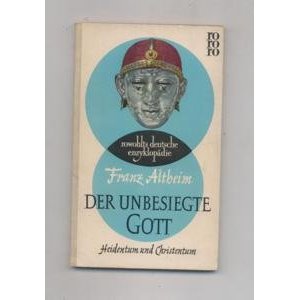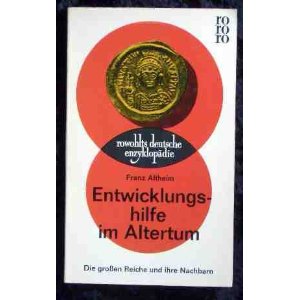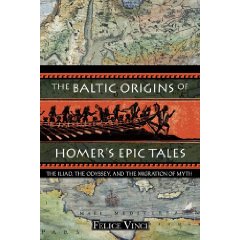 The real scene of the Iliad and the Odyssey can be identified not in the Mediterranean Sea, where it proves to be weakened by many incongruities, but in the north of Europe. The sagas that gave rise to the two poems came from the Baltic regions, where the Bronze Age flourished in the 2nd millennium B. C. and many Homeric places, such as Troy and Ithaca, can still be identified. The blond seafarers who founded the Mycenaean civilization in the 16th century B. C. brought these tales from Scandinavia to Greece after the decline of the “climatic optimum”. Then they rebuilt their original world, where the Trojan War and many other mythological events had taken place, in the Mediterranean; through many generations the memory of the heroic age and the feats performed by their ancestors in their lost homeland was preserved, and handed down to the following ages. This key allows us to easily open many doors that have been shut tight until now, as well as to consider the age-old question of the Indo-European diaspora and the origin of the Greek civilization from a new perspective.
The real scene of the Iliad and the Odyssey can be identified not in the Mediterranean Sea, where it proves to be weakened by many incongruities, but in the north of Europe. The sagas that gave rise to the two poems came from the Baltic regions, where the Bronze Age flourished in the 2nd millennium B. C. and many Homeric places, such as Troy and Ithaca, can still be identified. The blond seafarers who founded the Mycenaean civilization in the 16th century B. C. brought these tales from Scandinavia to Greece after the decline of the “climatic optimum”. Then they rebuilt their original world, where the Trojan War and many other mythological events had taken place, in the Mediterranean; through many generations the memory of the heroic age and the feats performed by their ancestors in their lost homeland was preserved, and handed down to the following ages. This key allows us to easily open many doors that have been shut tight until now, as well as to consider the age-old question of the Indo-European diaspora and the origin of the Greek civilization from a new perspective.
Ever since ancient times, Homeric geography has given rise to problems and uncertainty. The conformity of towns, countries and islands, which the poet often describes with a wealth of detail, with traditional Mediterranean places is usually only partial or even nonexistent. We find various cases in Strabo (the Greek geographer and historian, 63 B. C. – 23 A.D.), who, for example, does not understand why the island of Pharos, situated right in front of the port of Alexandria, in the Odyssey inexplicably appears to lie a day’s sail from Egypt. There is also the question of the location of Ithaca, which, according to very precise indications found in the Odyssey, is the westernmost in an archipelago which includes three main islands, Dulichium, Same and Zacynthus. This does not correspond to the geographic reality of the Greek Ithaca in the Ionian Sea, located north of Zacynthus, east of Cephallenia and south of Leucas. And then, what of the Peloponnese, described in both poems as a plain?
In other words, Homeric geography refers to a context with a toponymy with which we are familiar, but which, if compared with the actual physical layout of the Greek world, reveals glaring anomalies, which are hard to explain, if only on account of their consistency throughout the two poems. For example, the “strange” Peloponnese appears to be a plain not sporadically but regularly, and Dulichium, the “Long Island” (in Greek “dolichos” means “long”) located by Ithaca, is repeatedly mentioned not only in the Odyssey but also in the Iliad, but was never discovered in the Mediterranean. Thus we are confronted with a world which appears actually closed and inaccessible, apart from some occasional convergences, although the names are familiar (this, however, tends to be more misleading than otherwise in solving the problem).
A possible key to finally penetrating this puzzling world is provided by Plutarch (46 – 120 A.D.). In his work De facie quae in orbe lunae apparet (“The face that appears in the moon circle”), he makes a surprising statement: the island of Ogygia, (where Calypso held Ulysses before allowing him to return to Ithaca) is located in the North Atlantic Ocean, “five days’ sail from Britain”.
Plutarch’s indications lead us to identify Ogygia with one of the Faroe Islands (where we also come across an island with a Greek-sounding name: Mykines). Starting from here, the route eastwards, which Ulysses follows (Book V of the Odyssey) in his voyage from Ogygia to Scheria allows us to locate the latter, i.e. the land of the Phaeacians, on the southern coast of Norway, in an area perfectly fitting the account of his arrival, where archaeological traces of the Bronze Age are plentiful. Moreover, while on the one hand “sker” in Old Norse means a «sea rock», on the other in the narration of Ulysses’s landing Homer introduces the reversal of the river current (Od., V, 451-453), which is unknown in the Mediterranean world but is typical of the Atlantic estuaries during high tide.
From here the Phaeacians took Ulysses to Ithaca, located on the far side of an archipelago, which Homer talks about in great detail. At this point, a series of precise parallels makes it possible to identify a group of Danish islands, in the south of the Baltic Sea, which correspond exactly to all of Homer’s indications. Actually, the South-Fyn Archipelago includes three main islands: Langeland (the “Long Island”; which finally unveils the puzzle of the mysterious island of Dulichium), Aerø (which corresponds perfectly to Homeric Same) and Tåsinge (ancient Zacynthus). The last island in the archipelago, located westwards, “facing the night”, is Ulysses’s Ithaca, now known as Lyø. It is astonishing how closely it coincides with the directions of the poet, not only in its position, but also its topographical and morphological features. And here, amongst this group of islands, we can also identify the little island «in the strait between Ithaca and Same», where Penelope’s suitors tried to waylay Telemachus.
Moreover, the Elis, i.e. one of the regions of the Peloponnese, is described as facing Dulichium, thus is easily identifiable with a part of the large Danish island of Zealand. Therefore, the latter is the original «Peloponnese», i.e. the “Island of Pelops”, in the real meaning of the word “island” (“nêsos” in Greek). On the other hand, the Greek Peloponnese (which lies in a similar position in the Aegean Sea, i.e. on its southwestern side) is not an island, despite its name. Furthermore, the details reported in the Odyssey regarding both Telemachus’s swift journey by chariot from Pylos to Lacedaemon, along «a wheat-producing plain», and the war between Pylians and Epeans, as narrated in Book XI of the Iliad, have always been considered inconsistent with Greece’s uneven geography, while they fit in perfectly with the flat island of Zealand.
 Let us look for the region of Troy now. In the Iliad it is located along the Hellespont Sea, which is systematically described as being «wide» or even «boundless». We can, therefore, exclude the fact that it refers to the Strait of the Dardanelles, where the city found by Schliemann lies. The identification of this city with Homer’s Troy still raises strong doubts: we only have to think of Finley’s criticism in the World of Odysseus. It is also remarkable that Schliemann’s site corresponds to the location of the Greek-Roman Troy; however, Strabo categorically denies that the latter is identifiable with the Homeric city (Geography 13, 1, 27). On the other hand, the Danish Medieval historian Saxo Grammaticus, in his Gesta Danorum, often mentions a population known as «Hellespontians» and a region called Hellespont, which, strangely enough, seems to be located in the east of the Baltic Sea. Could it be Homer’s Hellespont? We can identify it with the Gulf of Finland, which is the geographic counterpart of the Dardanelles (as both of them lie northeast of their respective basins). Since Troy, as we can infer from a passage in the Iliad (XXI, 334-335), lay North-East of the sea (further reason to dispute Schliemann’s location), then it seems reasonable, for the purpose of this research, to look at a region of southern Finland, where the Gulf of Finland joins the Baltic Sea. In this area, west of Helsinki, we find a number of name-places which astonishingly resemble those mentioned in the Iliad and, in particular, those given to the allies of the Trojans: Askainen (Ascanius), Karjaa (Caria), Nästi (Nastes, the chief of the Carians), Lyökki (Lycia), Tenala (Tenedos), Kiila (Cilla), Raisio (Rhesus), Kiikoinen (the Ciconians) etc. There is also a Padva, which reminds us of Italian Padua, which was founded, according to tradition, by the Trojan Antenor and lies in Venetia (the «Eneti» or «Veneti» were allies of the Trojans). What is more, the place-names Tanttala and Sipilä (the mythical King Tantalus, famous for his torment, was buried on Mount Sipylus) indicate that this matter is not only limited to Homeric geography, but seems to extend to the whole world of Greek mythology.
Let us look for the region of Troy now. In the Iliad it is located along the Hellespont Sea, which is systematically described as being «wide» or even «boundless». We can, therefore, exclude the fact that it refers to the Strait of the Dardanelles, where the city found by Schliemann lies. The identification of this city with Homer’s Troy still raises strong doubts: we only have to think of Finley’s criticism in the World of Odysseus. It is also remarkable that Schliemann’s site corresponds to the location of the Greek-Roman Troy; however, Strabo categorically denies that the latter is identifiable with the Homeric city (Geography 13, 1, 27). On the other hand, the Danish Medieval historian Saxo Grammaticus, in his Gesta Danorum, often mentions a population known as «Hellespontians» and a region called Hellespont, which, strangely enough, seems to be located in the east of the Baltic Sea. Could it be Homer’s Hellespont? We can identify it with the Gulf of Finland, which is the geographic counterpart of the Dardanelles (as both of them lie northeast of their respective basins). Since Troy, as we can infer from a passage in the Iliad (XXI, 334-335), lay North-East of the sea (further reason to dispute Schliemann’s location), then it seems reasonable, for the purpose of this research, to look at a region of southern Finland, where the Gulf of Finland joins the Baltic Sea. In this area, west of Helsinki, we find a number of name-places which astonishingly resemble those mentioned in the Iliad and, in particular, those given to the allies of the Trojans: Askainen (Ascanius), Karjaa (Caria), Nästi (Nastes, the chief of the Carians), Lyökki (Lycia), Tenala (Tenedos), Kiila (Cilla), Raisio (Rhesus), Kiikoinen (the Ciconians) etc. There is also a Padva, which reminds us of Italian Padua, which was founded, according to tradition, by the Trojan Antenor and lies in Venetia (the «Eneti» or «Veneti» were allies of the Trojans). What is more, the place-names Tanttala and Sipilä (the mythical King Tantalus, famous for his torment, was buried on Mount Sipylus) indicate that this matter is not only limited to Homeric geography, but seems to extend to the whole world of Greek mythology.
What about Troy? Right in the middle of this area, halfway between Helsinki and Turku, we discover that King Priam’s city has survived the Achaean sack and fire. Its characteristics correspond exactly to those Homer handed down to us: the hilly area which dominates the valley with its two rivers, the plain which slopes down towards the coast, and the highlands in the background. It has even maintained its own name almost unchanged throughout all this time. Today, Toija is a peaceful Finnish village, unaware of its glorious and tragic past.
Various trips to these places, from July 11 1992 onwards, have confirmed the extraordinary correspondence between the Iliad‘s descriptions and the area surrounding Toija. What is more, there we come across many significant traces of the Bronze Age. Incredibly, towards the sea we find a place called Aijala, which recalls the “beach” («aigialos»), where, according to Homer, the Achaeans beached their ships (Il., XIV, 34). The correspondence extends to the neighbouring areas. For example, along the Swedish coast facing Southern Finland, 70 km north of Stockholm, the long and relatively narrow Bay of Norrtälje recalls Homeric Aulis, whence the Achaean fleet set sail for Troy. Nowadays, ferries leave here for Finland, following the same ancient course. They pass the island of Lemland, whose name reminds us of ancient Lemnos, where the Achaeans stopped and abandoned the hero Philoctetes. Nearby is Åland, the largest island of the homonymous archipelago, which probably coincides with Samothrace, the mythical site of the metalworking mysteries. The adjacent Gulf of Bothnia is easily identifiable with Homer’s Thracian Sea, and the ancient Thrace, which the poet places to the North-West of Troy on the opposite side of the sea, probably lay along the northern Swedish coast and its hinterland (it is remarkable that the Younger Edda identifies the home of the god Thor with Thrace). Further south, outside the Gulf of Finland, the island of Hiiumaa, situated opposite the Esthonian coast, corresponds exactly to Homer’s Chios, which, according to the Odyssey, lay on the return course of the Achaean fleet after the war.
In short, apart from the morphological features of this area, the geographic position of the Finnish Troas fits Homer’s directions like a glove. Actually, this explains why a «thick fog» often fell on those fighting on the Trojan plain, and Ulysses’s sea is never as bright as that of the Greek islands, but always «dark-wine» and «misty». As we travel through Homer’s world, we experience the harsh weather which is typical of the Northern world. Everywhere in the two poems the weather, with its fog, wind, rain, cold temperatures and snow (which falls on the plains and even out to sea), has little in common with the Mediterranean climate; moreover, sun and warm temperatures are hardly ever mentioned.
There are countless examples of this; for instance, when Ulysses recalls an episode of the Trojan War:
«The night was bad, after the north wind dropped,
and freezing; then the snow began to fall like icy frost
and ice congealed on our shields» (Od., XIV, 475-477).
In a word, most of the time the weather is unsettled, so much so that a bronze-clad fighting warrior invokes a cloudless sky during the battle (Il., XVII, 643-646). We are worlds away from the torrid Anatolian lowlands. The way in which Homer’s characters are dressed is in perfect keeping with this kind of climate. In the sailing season they wear tunics and heavy cloaks which they never remove, not even during banquets. This attire corresponds exactly to the remains of clothing found in Bronze Age Danish graves, down to such details as the metal brooch which pinned the cloak at the shoulder (Od., XIX, 226). Moreover, this fits in perfectly with what Tacitus states on Germanic clothing:
«The suit for everyone is a cape with a buckle»
(«sagum fibula consertum»; Germania, 17, 1).
This northern collocation also explains the huge anomaly of the great battle which takes up the central books of the Iliad. The battle continues for two days (Il., XI, 86; XVI, 777) and one night (Il., XVI, 567). The fact that the darkness does not put a stop to the fighting is incomprehensible in the Mediterranean world, but it becomes clear in the Baltic setting. What allows Patroclus’s fresh troops to carry on fighting through to the following day, without a break, is the faint night light, which is typical of high latitudes during the summer solstice. This interpretation -corroborated by the overflowing of the Scamander during the following battle (in the northern regions this occurs in May or June owing to the thaw)- allows us to reconstruct the stages of the whole battle in a coherent manner, dispelling the present-day perplexities and strained interpretations. Furthermore, we even manage to pick out from a passage in the Iliad (VII, 433) the Greek word used to denominate the faintly-lit nights typical of the regions located near the Arctic Circle: the «amphilyke nyx» is a real “linguistic fossil” which, thanks to the Homeric epos, has survived the migration of the Achaeans to Southern Europe.
It is also important to note that the Trojan walls, as described by Homer, appear as a sort of rustic fence made of wood and stone, similar to the archaic Northern wooden enclosures (such as the Kremlin Walls up to the 15th century) much more than the mighty strongholds of the Aegean civilizations.
Troy, therefore, was not deserted after the Achaeans plundered and burnt it down, but was rebuilt, as the Iliad states:
«At this point Zeus has come to hate Priam’s stock,
so Aeneas’s power will rule the Trojans now
and then his children’s children and those who will come later on» (Il., XX, 306-308).
On the contrary, Virgil’s quite tendentious, and much more recent, tale of Aeneas’s flight by sea from the burning city of Troy (a homage paid to the emperor Augustus’s family, considered Aeneas’s descendant) is absolutely unrelated to the real destiny of the Trojan hero and his city after the war. As regards this “Finnish” Aeneas, the first king of the dynasty that, according with Homer, ruled Troy after the war (that is a kingdom which, under Priam, dominated a vast area in southern Finland; Il., XXIV, 544-546) it should be very tempting to suppose a relationship between his name and «Aeningia», Finland’s name in Roman times (Pliny, Natural History, IV, 96).
It is remarkable that farmers often come across Bronze and Stone Age relics in the fields surrounding Toija. This is proof of human settlements in this territory many thousands of years ago. Further, in the area surrounding Salo (only 20 km from Toija), archaeologists have found splendid specimens of swords and spear points that date back to the Bronze Age and are now on display in the National Museum of Helsinki. These findings come from burial places, which include tumuli made of large mounds of stones that can be found at the top of certain hills, which rise from the plain today, but which, thousands of years ago, when the coastline was not as far back as it is nowadays, faced directly onto the sea. This relates to a passage in the Iliad, where Hector challenges an Achaean hero to a duel, undertaking, in case of victory, to give back the corpse of his opponent
«so that the long-haired Achaeans can bury him
and erect a mound for him on the broad Hellespont,
and some day one of the men to come,
sailing with a multioared ship on the wine-dark sea, will say:
“This is the mound of a man slain in ancient times,
he excelled but renowned Hector killed him”»
(Il., VII, 85-90; the description of Achilles’ tomb in the last canto of the Odyssey is analogous).
These Homeric mounds «on the broad Hellespont» and the Bronze Age ones near Salo are remarkably similar.
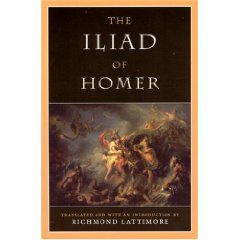 Let us now examine the so-called Catalogue of Ships from Book II of the Iliad, that lists the twenty-nine Achaean fleets which took part in the Trojan War, together with the names of their captains and places of origin. This list unwinds in an anticlockwise direction, starting from Central Sweden, travelling along the Baltic coasts and finishing in Finland. If we combine this with the data contained in the two poems and in the rest of Greek mythology, we may completely reconstruct the Achaean world around the Baltic Sea, where, as archaeology confirms, the Bronze Age was flourishing in the 2nd millennium B. C., favoured by a warmer climate than today’s.
Let us now examine the so-called Catalogue of Ships from Book II of the Iliad, that lists the twenty-nine Achaean fleets which took part in the Trojan War, together with the names of their captains and places of origin. This list unwinds in an anticlockwise direction, starting from Central Sweden, travelling along the Baltic coasts and finishing in Finland. If we combine this with the data contained in the two poems and in the rest of Greek mythology, we may completely reconstruct the Achaean world around the Baltic Sea, where, as archaeology confirms, the Bronze Age was flourishing in the 2nd millennium B. C., favoured by a warmer climate than today’s.
In this new geographical context, the entire universe belonging to Homer and Greek mythology finally discloses itself with its astonishing consistency. For example, by following the Catalogue sequence, we immediately locate Boeotia (corresponding to the area around Stockholm). Here it is easy to identify Oedipus’s Thebes and the mythical Mount Nysa (which was never found in the Greek world), where the Hyads nursed baby Dionysus. Homer’s Euboea coincides with today’s island of Öland, located off the Swedish coast in a similar position to that of its Mediterranean counterpart. Mythical Athens, Theseus’s native land, lay in the area of present day Karlskrona in southern Sweden (this explains why Plato, in his dialogue Critias, refers to it as being an undulating plain full of rivers, which is totally alien to Greece’s rough morphology). The features of other Achaean cities, such as Mycenae or Calydon, as described by Homer also appear completely different from those of their namesakes on Greek soil. In particular, Mycenae lay in the site of today’s Copenhagen, where the island of Amager possibly recalls its ancient name and explains why it was in the plural. Here, in the flat island of Zealand (i.e. the Homeric «Peloponnese»), we can easily identify Agamemnon’s and Menelaus’s kingdoms, Arcadia, the River Alpheus, and in particular, king Nestor’s Pylos, whose location was held to be a mystery even by the ancient Greeks. By setting Homer’s poems in the Baltic, this age-old puzzle is also solved at once. What is more, it is equally easy to solve the problem of the strange border between Argolis and Pylos, which is mentioned in the Iliad (IX, 153) but is “impossible” in the Greek world. After the Peloponnese, the Catalogue mentions Dulichium and continues with Ithaca’s archipelago, which was already identified by making use of the indications the Odyssey supplies. We are thus able to verify the consistency of the information contained in the two poems as well as their congruity with the Baltic geography. After Ithaca, the list continues with the Aetolians, who recall the ancient Jutes. They gave their name to Jutland, which actually lies near the South-Fyn Islands. Homer mentions Pylene in the Aetolian cities, which corresponds to today’s Plön, in Northern Germany, not far from Jutland. Opposite this region, in the North Sea, the name of Heligoland, one of the North Frisian Islands, recalls Helike, a sanctuary of the god Poseidon mentioned in the Iliad (it is remarkable that an old name for Heligoland was Fositesland, where «Fosite», an ancient Frisian god, is virtually identical to Poseidon).
As regards Crete, the «vast land» with «a hundred cities» and many rivers, which is never referred to as an island by Homer, it corresponds to the Pomeranian region in the southern Baltic area, which stretches from the German coast to the Polish same. This explains why in the rich pictorial productions of the Minoan civilization, which flourished in Aegean Crete, we find no hint of Greek mythology, and ships are so scantily represented. It would also be tempting to assume a relationship between the name «Polska» and the Pelasgians, the inhabitants of Homeric Crete. At this point, it is also easy to identify Naxos (where Theseus left Ariadne on his return journey from «Crete» to «Athens») with the island of Bornholm, situated between Poland and Sweden, where the town of Neksø still recalls the ancient name of the island. Likewise, we discover that the Odyssey‘s «River Egypt» probably coincides with the present-day Vistula, thus revealing the real origin of the name the Greeks gave to Pharaohs’ land, known as «Kem» in the local language. This explains the incongruous position of the Homeric Egyptian Thebes, which, according to the Odyssey, is located near the sea. Evidently the Egyptian capital, which on the contrary lies hundreds of kilometres from the Nile delta and was originally known as Wò’se, was renamed by the Achaeans with the name of a Baltic city, after they moved down to the Mediterranean. The real Thebes probably was the present-day Tczew, on the Vistula delta. To the north of the latter, in the centre of the Baltic Sea, the island of Fårö recalls the Homeric Pharos, which according to the Odyssey lay in the middle of the sea at a day’s sail from «Egypt» (whereas Mediterranean Pharos is not even a mile’s distance from the port of Alexandria). Here is the solution to another puzzle of Homeric geography that so perturbed Strabo.
The Catalogue of Ships now touches the Baltic Republics. Hellas lay on the coast of present-day Esthonia, and thus next to the Homeric Hellespont (i.e. the «Helle Sea»), today’s Gulf of Finland. In this area also lies Kurland -the Curians’ country, that is the mythical Curetes, linked with the worship of Zeus- where is found the figure of a supreme god, who is called Dievas in Lithuania and Dievs in Latvia; in local folklore he shows features typical of Hellenic Zeus (the genitive case of the name «Zeus» in Greek is «Diòs»; Il., I, 5). Moreover, Lithuanian has very archaic features and a notable affinity with the ancient Indo-European language. Phthia, Achilles’s homeland, lay on the fertile hills of southeastern Esthonia, along the border with Latvia and Russia, stretching as far as the Russian river Velikaja and the lake of Pskov. Myrmidons and Phthians lived there, ruled by Achilles and Protesilaus (the first Achaean captain who fell in the Trojan War) respectively. Next, proceeding with the sequence, we reach the Finnish coast, facing the Gulf of Bothnia, where we find Jolkka, which reminds us of Iolcus, Jason’s mythical city. Further north, we are also able to identify the region of Olympus, Styx and Pieria in Finnish Lapland (which in turn recalls the Homeric Lapithae, i.e. the sworn enemies of the Centaurs who also lived in this area). This location of Pieria north of the Arctic Circle is confirmed by an apparent astronomical anomaly, linked to the moon cycle, which is found in the Homeric Hymn to Hermes: it can only be explained by the high latitude. The «Home of Hades» was even further northwards, on the icy coasts of Russian Karelia: here Ulysses arrived, his journeys representing the last vestige of prehistoric routes in an era which was characterised by a very different climate from today’s.
In conclusion, from this review of the Baltic world, we find its astonishing consistency with the Catalogue of Ships -which is, therefore, an extraordinary “photograph” of the Northern Early Bronze Age peoples- as well as with the whole of Greek mythology. It is very unlikely that this immense number of geographic, climatic, toponymical and morphological parallels is to be ascribed to mere chance, even leaving aside the glaring contradictions arising from the Mediterranean setting.
As regards Ulysses’ trips, after the Trojan War, when he is about to reach Ithaca, a storm takes him away from his world; so he has many adventures in fabulous localities until he reaches Ogygia, that is one of the Faroe Islands. These adventures, presumably taken from tales of ancient seamen and elaborated again by the poet’s fantasy, represent the last memory of the sea routes followed by the ancient navigators of the Northern Bronze Age out of the Baltic, in the North Atlantic (where the «Ocean River» flows, i.e. the Gulf Stream), but they became unrecognizable because of their transposition into a totally different context. For example, the Eolian island, ruled by the «King of the winds», «son of the Knight», is one of the Shetlands (maybe Yell), where there are strong winds and ponies. Cyclops lived in the coast of Norway (near Tosenfjorden: the name of their mother is Toosa): they coincide with the Trolls of the Norwegian folklore. The land of Lestrigonians was in the same coast, towards the North; Homer says that there the days are very long (the famous scholar Robert Graves places the Lestrigonians in the North of Norway; moreover, in that area we find the island of Lamøj, which is probably the Homeric Lamos). The island of sorceress Circe -where there are clear hints at the midnight sun (Od., X, 190-192) and the revolving dawns (Od., XII, 3-4), typical phenomena of the Arctic regions- is one of the Lofoten, beyond the Arctic Circle. Charybdis is the well-known whirlpool named Maelstrom, south of the island of Moskenes (one of the Lofoten). South of Charybdis Odysseus meets the island Thrinakia, that means «trident»: really, near the Maelstrom lies Mosken, a three-tip island. The Sirens are shoals and shallows, off the western face of the Lofoten, before the Maelstrom area, which are made even more dangerous by the fog and the size of the tides. The sailors could be attracted by the misleading noise of the backwash (the «Sirens’ Song» is a metaphor similar to Norse «kenningar») on the half-hidden rocks into deceiving themselves that landing is at hand, but if they get near, shipwreck on the reefs is inevitable.
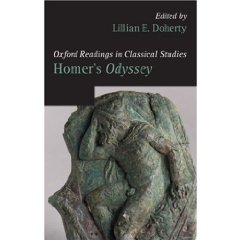 Besides, we can find remarkable parallels between Greek and Norse mythology: for example, Ulysses is similar to Ull, archer and warrior of Norse mythology; the sea giant Aegaeon (who gave his name to the Aegean Sea) is the counterpart of the Norse sea god Aegir, and Proteus, the Old Man of the Sea (who is a mythical shepherd of seals, who lives in the sea depths and is capable of foretelling the future) is similar to the «marmendill» (mentioned by the Hàlfs Saga ok Hàlfsrekka and the Landnàmabòk), a very odd creature, who resembles a misshapen man with a seal-shaped body below the waist, and has the gift of prophecy but only talks when he feels like it, just like Proteus. On the other hand, there are remarkable analogies between the Achaean and Viking ships: by comparing the details of Homeric ships with the remains of Viking ships found in the bay of Roskilde, we realize that their features were very similar. We refer to the flat keel (one infers this from Od., XIII, 114), the double prow (we can deduce this from the expression «amphiélissai» Homer frequently uses with regard to their double curve, i.e. at the stern and the prow), and the removable mast -this is a sophisticated feature typical of Viking ships, which was typical of Homeric ships, too: many passages in both the Iliad (I, 434; I, 480) and the Odyssey (II, 424-425; VIII, 52) confirm without a shadow of doubt that the operations of setting up and taking down the mast were customary at the beginning and the end of each mission.
Besides, we can find remarkable parallels between Greek and Norse mythology: for example, Ulysses is similar to Ull, archer and warrior of Norse mythology; the sea giant Aegaeon (who gave his name to the Aegean Sea) is the counterpart of the Norse sea god Aegir, and Proteus, the Old Man of the Sea (who is a mythical shepherd of seals, who lives in the sea depths and is capable of foretelling the future) is similar to the «marmendill» (mentioned by the Hàlfs Saga ok Hàlfsrekka and the Landnàmabòk), a very odd creature, who resembles a misshapen man with a seal-shaped body below the waist, and has the gift of prophecy but only talks when he feels like it, just like Proteus. On the other hand, there are remarkable analogies between the Achaean and Viking ships: by comparing the details of Homeric ships with the remains of Viking ships found in the bay of Roskilde, we realize that their features were very similar. We refer to the flat keel (one infers this from Od., XIII, 114), the double prow (we can deduce this from the expression «amphiélissai» Homer frequently uses with regard to their double curve, i.e. at the stern and the prow), and the removable mast -this is a sophisticated feature typical of Viking ships, which was typical of Homeric ships, too: many passages in both the Iliad (I, 434; I, 480) and the Odyssey (II, 424-425; VIII, 52) confirm without a shadow of doubt that the operations of setting up and taking down the mast were customary at the beginning and the end of each mission.
More generally speaking, apart from the respective mythologies, remarkable parallels are found between the customs of the Achaeans and those of the populations of Northern Europe, although they are separated by almost 3000 years. The systems of social relations, interests and lifestyles of the Homeric world and Viking society, despite the elapsed years, are surprisingly similar. For instance, the «agorà», the public assembly in the Homeric world, corresponds to the «thing» of the Vikings: this was the most important political moment in the running of the community for both peoples. In his turn, Tacitus informs us that at his time the northern populations held public assemblies (Germania, chap. 11), that appear to be very similar to the «thing» (therefore, to the «agorà», too). In a word, the parallels between the Homeric Achaeans, who lived during the Bronze Age, the Germans of the Roman period, and the Medieval Vikings testify to the continuity of the Northern world throughout the ages.
We should note that many Homeric peoples, as the Danaans, Pelasgians, Dorians, Curetes, Lybians and Lapithae, whose traces are not found in the Mediterranean, probably still exist in the Baltic world: they find their present counterparts in the Danes, Poles, Thuringians, Kurlandians, Livonians and Lapps (this identification is supported by their respective geographic locations). Moreover, both poems mention the Sintians, mythical inhabitants of Lemnos who were linked with the smith god Hephaestus (Il., I, 594; Od., VIII, 294): their name is exactly the same as today’s Sintians, i.e. a tribe of Gypsies’, who traditionally are metalworkers and coppersmiths. We also note a possible relationship between the «Argives», another name for the Achaeans, «Argeioi» in Greek -i.e. (V)argeioi, considering the usual loss of the initial V (the «digamma») in the Homeric language- and the “Varangians” (Swedish Vikings).
As regards the Homeric Danaans («Dànaioi» in Greek, who were also Achaeans), at the beginning of the Gesta Danorum, Saxo Grammaticus states that «Dudon, who wrote a story about Aquitania, believes that the Danes owe their origins and name to the Danaans» (I, I, 1). This comparison has hitherto been interpreted as a means of exalting the origin of the Danes, but now one could start to see them in a new light. If we still dwell upon the digamma, we should consider now the relationship between the Greek words «areté» (valour) and «àte» (fault or error) and their Latin counterparts «virtus» and «vitium» respectively (apart from the initial V, the vowels A and I are often interchangeable: for example, «ambush» corresponds to the Italian «imboscata»). By applying the same alteration (i.e. A→VI) to the name of the Achaeans («Achaioi» in Greek), we get the word “Vikings”. In a word, Argeioi, Danaioi, and Achaioi, i.e. the three main names Homer gives the peoples comprising the protagonists of his poems, possibly came down to modern times as Varangians, Danes, and Vikings (never found in the Mediterranean area, even in ancient times) respectively.
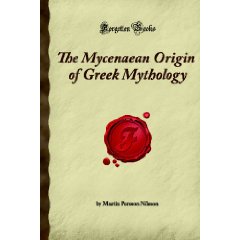 Here, therefore, is the “secret” which is hidden inside Homer’s poems and is responsible for all the oddities of Homeric geography: the Trojan War and the other events Greek mythology handed down were not set in the Mediterranean, but in the Baltic area, i.e. the primitive home of the blond, «long-haired» Achaeans (the Odyssey claims that Ulysses was fair-haired; XIII, 399; XIII, 431). On this subject, the distinguished Swedish scholar, Professor Martin P. Nilsson, in his works reports considerable archaeological evidence uncovered in the Mycenaean sites in Greece, corroborating their northern origin. Some examples are: the existence of a large quantity of baltic amber in the most ancient Mycenaean tombs in Greece (which is not to be ascribed to trade, because the amber is very scarce in the coeval Minoan tombs in Crete as well as in later graves on the continent); the typically Northern features of their architecture (the Mycenaean megaron is identical to the hall of the ancient Scandinavian Kings); the similarity of two stone slabs found in a tomb in Dendra with the menhirs known from the Bronze Age of Central Europe; the Northern-type skulls found in the necropolis of Kalkani, etc.. Moreover, Aegean art and Scandinavian remains dating back to the Bronze Age present a remarkable affinity -for example, the figures engraved on Kivik’s tomb in Sweden- so much so that a 19th century scholar suggested the monument was built by the Phoenicians.
Here, therefore, is the “secret” which is hidden inside Homer’s poems and is responsible for all the oddities of Homeric geography: the Trojan War and the other events Greek mythology handed down were not set in the Mediterranean, but in the Baltic area, i.e. the primitive home of the blond, «long-haired» Achaeans (the Odyssey claims that Ulysses was fair-haired; XIII, 399; XIII, 431). On this subject, the distinguished Swedish scholar, Professor Martin P. Nilsson, in his works reports considerable archaeological evidence uncovered in the Mycenaean sites in Greece, corroborating their northern origin. Some examples are: the existence of a large quantity of baltic amber in the most ancient Mycenaean tombs in Greece (which is not to be ascribed to trade, because the amber is very scarce in the coeval Minoan tombs in Crete as well as in later graves on the continent); the typically Northern features of their architecture (the Mycenaean megaron is identical to the hall of the ancient Scandinavian Kings); the similarity of two stone slabs found in a tomb in Dendra with the menhirs known from the Bronze Age of Central Europe; the Northern-type skulls found in the necropolis of Kalkani, etc.. Moreover, Aegean art and Scandinavian remains dating back to the Bronze Age present a remarkable affinity -for example, the figures engraved on Kivik’s tomb in Sweden- so much so that a 19th century scholar suggested the monument was built by the Phoenicians.
Another sign of the Achaean presence in the Northern world in a very distant past is a Mycenaean graffito found in the megalithic complex of Stonehenge in Southern England. Other remains revealing the Mycenaean influence were found in the same area (“Wessex culture”), which date back to a period preceding the Mycenaean civilization in Greece. A trace of contact is found in the Odyssey, which mentions a market for bronze placed overseas, in a foreign country, named «Temese», never found in the Mediterranean area. Since bronze is an alloy of copper and tin, which in the North is only found in Cornwall, it is very likely that the mysterious Temese corresponds to the Thames, named «Tamesis» or «Tamensim» in ancient times. So, following Homer, we learn that, during the Bronze Age, the ancient Scandinavians used to sail to Temese-Thames, «placed overseas in a foreign country», to supply themselves with bronze.
This theory -which has already undergone a positive check by means of inspections carried out on the territories concerned, and meets Popper’s requirement on “falsifiability”- solves many other problems, such as the backwardness of the Homeric civilization compared to the Mycenaeans’; the absence of reference to seafaring and Greek mythology in the Minoan-Cretan world; the inconsistencies between the morphology of several Homeric cities, such as Mycenae and Calydon, and their Greek namesakes; the absurdities concerning the regions of the Peloponnese, and the distance of the allies of the Trojans from the Dardanelles area, and so on. We should also note that oxen are of the utmost importance in the Homeric world: this is the yet further evidence that we are not dealing with a Greek setting, undoubtedly more suitable for goats than oxen, but with a Northern one. Moreover, in a Greek environment one would expect a surfeit of pottery, but this is not the case: in both poems tableware is made solely of metal or wood, while pottery is absent. The poet talks of metal vases, usually of gold or silver.
For example, in Ulysses’s palace in Ithaca,
«a maid came to pour water from a beautiful
golden jug into a silver basin» (Od., I, 136-137).
People poured wine «into gold goblets» (Od., III, 472) and «gold glasses» (Od., I, 142). Lamps (Od., XIX, 34), cruets (Od., VI, 79) and urns, like the one (Il., XXIII, 253) containing Patroclus’s bones, were made of gold. The vessels used for pouring wine were also of metal: when one of them fell to the ground, instead of breaking, it «boomed» (Od., XVIII, 397). In a word, on the one hand, the Homeric poems do not mention any ceramic pottery, which is typical of the Mediterranean world, but, on the other, they are strikingly congruent with the Northern world, where scholars find a stable and highly advanced bronze founding industry, compared to the pottery one, which was far more modest. As to the poor, they used wooden jugs (Od., IX, 346; XVI, 52), i.e. the cheapest and most natural form of vessel, considering the abundance of this material in the North: Esthonia and Latvia have a very ancient tradition of wooden beer tankards.
Therefore, it was along the Baltic coast that Homer’s events took place, before the Mycenaean migration southwards, in the 16th century B. C.. This period is close to the end of an exceptionally hot climate that had lasted several thousands of years, the “post-glacial climatic optimum”. It corresponds to the Atlantic phase of the Holocene, when temperatures in northern Europe were much higher than today (at that time the broad-leaved forests reached the Arctic Circle and the tundra disappeared even from the northernmost areas of Europe). The “climatic optimum” reached its peak around 2500 B. C. and began to drop around 2000 B. C. (“Sub-Boreal phase”), until it came to an end some centuries later. It is highly likely that this was the cause that obliged the Achaeans to move down to the Mediterranean for this reason. They probably followed the Dnieper river down to the Black Sea, as the Vikings (whose culture is, in many ways, quite similar) did many centuries later. The Mycenaean civilisation, which did not originate in Greece, was thus born and went on to flourish from the 16th century B. C., soon after the change in North European climate.
The migrants took their epos and geography along with them and attributed the same names they had left behind in their lost homeland to the various places where they eventually settled. This heritage was immortalized by the Homeric poems and Greek mythology (the latter lost the memory of the great migration from the North probably after the collapse of the Mycenaean civilization, around the 12th century B. C., but kept a vague memory of its “hyperborean” links). Moreover, they renamed with Baltic names not only the new countries where they settled, but also other Mediterranean regions, such as Libya, Crete and Egypt, thus creating an enormous “geographical misunderstanding” which has lasted until now. The above-mentioned transpositions of Northern place-names were certainly encouraged, if not suggested, by a certain similarity (which the Mycenaeans realized owing to their inclination for seafaring) between Baltic geography and that of the Aegean: we only have to think of the analogy Öland-Euboea or Zealand-Peloponnese (where they were obliged to force the concept of island in order to maintain the original layout). The increasing presence of Greek-speaking populations in the Mediterranean basin, with their cultural and trade supremacy, later consolidated this phenomenon, from the time of Mycenaean civilization to the Hellenistic-Roman period.
In short, besides the geographic correspondences, in favour of this theory there is the remarkable temporal concurrence between the end of the “climatic optimum” in northern Europe and the settling of the Mycenaeans in the Aegean area. We should also note that a catastrophic event happened at that time: we refer to the eruption of the volcano of Thera (Santorini), around the year 1630 B. C., which presumably extinguished the Minoan civilization in Crete and certainly had severe climatic consequences worldwide (traces of it were found even in the annual rings of very ancient American trees), giving rise to atmospheric phenomena which must have terrorized the Bronze Age civilizations in Northern Europe. If we consider that the “optimum” had begun to decline some centuries before, this event probably started, or quickened, the final collapse.
This is the same age as the arising of Aryan, Hyksos, Hittite and Cassite settlements in India, Egypt, Anatolia and Mesopotamia respectively. In a word, the end of the “climatic optimum” can explain the cause of the contemporary migrations of other Indo-European populations (following a recent research carried on by Prof. Jahanshah Derakhshani of Teheran University, the Hyksos very likely belong to the Indo-European family). The original homeland of the Indo-Europeans was probably located in the furthest north of Europe, when the climate was much warmer than today’s. However, on the one hand G. B. Tilak in The Arctic home of the Vedas claims the Arctic origin of the Aryans, “cousins” of the Achaeans, on the other both Iranian and Norse mythology remember that the original homeland was destroyed by cold and ice. It is also remarkable that, following Tilak (The Orion), the original Aryan civilization flourished in the «Orionic period», when the constellation of Orion marked the spring equinox. It happened in the period from 4000 up to 2500 B. C., corresponding to the peak of the “climatic optimum”.
We also note the presence of a population known as the Tocharians in the Tarim Basin (northwest China) from the beginning of the 2nd millennium B. C. They spoke an Indo-European language and were tall, blond with Caucasian features. This dating provides us with yet another confirmation of the close relationship between the decline of the “climatic optimum” and the Indo-European diaspora from Scandinavia and other Northern regions. In this picture, it is amazing that the Bronze Age starts in China just between the 18th and the 16th centuries B. C. (Shang dynasty). We should note that the Chinese pictograph indicating the king is called «wang», which is very similar to the Homeric term «anax», i.e. “the king” (corresponding to «wanax» in Mycenaean Linear B tablets).
On the other hand, the terms «Yin» and «Yang» (which express two complementary principles of Chinese philosophy: Yin is feminine, Yang masculine) could be compared with the Greek roots «gyn-» and «andr-» respectively, which also refer to the “woman” and the “man” («anér edé gyné», “man and woman”, Od., VI, 184). Moreover, it is no accident that in this period the Steppe peoples -the Scythians, as the Greeks used to call them- who were blond or red-haired, flourished in the area where the Volga and the Dnieper run, the rivers that played such an important role as trade and transit routes between north and south. A passage from Herodotus about the origin of the Scythians corroborates this picture:
«They say that 1000 years elapsed from their origin and their first king Targitaos to Darius’s expedition against them» (History, IV, 7).
As this expedition dates back to 514 B. C., their origin would thus date back to the 16th century B. C., i.e. the epoch of the Mycenaean migration. One could venture to include in this picture the Olmecs also. They seem to have reached the southern Gulf Coast of Mexico in about the same period; thus, one could infer that they were a population who had formerly lived in the extreme north of the Americas (being connected to the Indo-European civilization through the Arctic Ocean, which was not frozen at that time), and then moved to the South when the climate collapsed (this, of course, could help to explain certain similarities with the Old World, apart from other possible contacts).
Returning to Homer, this reconstruction not only explains the extraordinary consistency between the Baltic-Scandinavian context and Homer’s world (compared to all the contradictions, over which the ancient Greek scholars racked their brains in vain, arising when one tries to place the Homeric geography in the Mediterranean), but also clarifies why the latter was decidedly more archaic than the Mycenaean civilization. Evidently, the contact with the refined Mediterranean and Eastern cultures favoured its rapid evolution, also considering their marked inclination for trade and seafaring which pervades not only the Homeric poems, but also all Greek mythology. Furthermore, this thesis fits in very well with the strong seafaring characterisation of the Mycenaeans. As a matter of fact, archaeologists confirm that the latter had been intensely practicing seafaring from their settling in Greece (their trade stations are found in many Mediterranean shores). Therefore, they had inherited a tradition dating back to a long time before, which implies that their original land lay near the sea. Further, the northern features of their architecture and their own physical traits fit in perfectly with the parallels between Homeric and Norse myths, which not only possess extremely archaic features, but also are of an undeniably seafaring nature. This is hard to explain with the current hypotheses about the continental origin of the Indo-Europeans, whereas the remains found in England fit in very well with the idea of a previous coastal homeland (by associating this with the typically northern features of their architecture we remove any doubt as to their place of origin).
Many signs prove the antiquity of the two poems and their temporal incongruity with Greek culture (this also explains why any reliable information regarding the author, or authors, of the poems had been lost before classical times), showing that they in fact belong to a “barbaric” European civilization, very far from the Aegean, as has been noticed by authoritative scholars, such as Prof. Stuart Piggott in his Ancient Europe. Moreover, Radiocarbon dating, corrected with dendrochronology (i.e. tree-ring calibration) has recently questioned the dogma of the Eastern origin of European civilization. Prof. Colin Renfrew describes the consequences for traditional chronology:
«These changes bring with them a whole series of alarming reversals in chronological relationships. The megalithic tombs of western Europe now become older than the Pyramids or the round tombs of Crete, their supposed predecessors. The early metal-using cultures of the Balkans antedate Troy and the early bronze age Aegean, from which they were supposedly derived. And in Britain, the final structure of Stonehenge, once thought to be the inspiration of Mycenaean architectural expertise, was complete well before the Mycenaean civilization began» (Before civilization, the radiocarbon revolution and prehistoric Europe, chap. 4, “The Tree-ring Calibration of Radiocarbon”).
Consequently, Prof. Renfrew goes so far as to say:
«The whole carefully constructed edifice comes crashing down, and the story-line of the standard textbooks must be discarded» (Before civilization, chap. 5, “The Collapse of the Traditional Framework”).
To conclude, this key could allow us to easily open many doors that have been shut tight until now, as well as to consider the age-old question of the Indo-European diaspora from a new perspective.





 del.icio.us
del.icio.us
 Digg
Digg


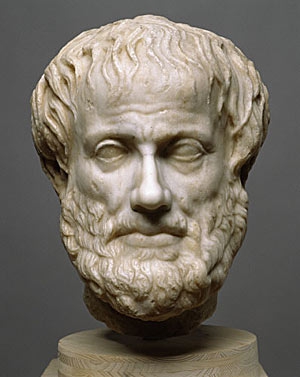 L’une des meilleurs définitions a été donné par Aristote : « La liberté – ou démocratie – consiste dans le fait d’être tour à tour gouverné et gouvernant… »
L’une des meilleurs définitions a été donné par Aristote : « La liberté – ou démocratie – consiste dans le fait d’être tour à tour gouverné et gouvernant… »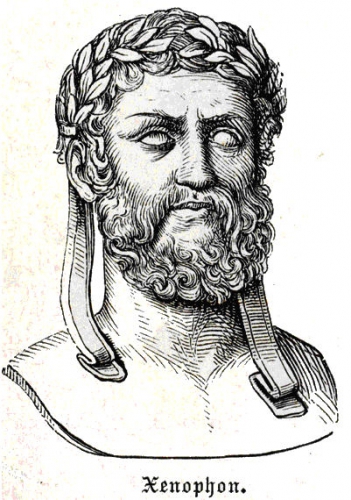 Xénophon a réellement été l’initiateur du régime monarchique. « Ce qui fait les rois ou les chefs (…) c’est la science du commandement ». Le roi est comparable au pilote qui guide le navire. Xénophon décrit un homme qui détient une supériorité sur tous les autres, car il « sait ». On ne naît pas roi, on ne l’est pas non plus par le fait, ni encore par l’élection : on le devient ! La monarchie est un art qui, comme tous les autres arts, suppose un apprentissage, la connaissance des lois et des maîtres pour les enseigner.
Xénophon a réellement été l’initiateur du régime monarchique. « Ce qui fait les rois ou les chefs (…) c’est la science du commandement ». Le roi est comparable au pilote qui guide le navire. Xénophon décrit un homme qui détient une supériorité sur tous les autres, car il « sait ». On ne naît pas roi, on ne l’est pas non plus par le fait, ni encore par l’élection : on le devient ! La monarchie est un art qui, comme tous les autres arts, suppose un apprentissage, la connaissance des lois et des maîtres pour les enseigner.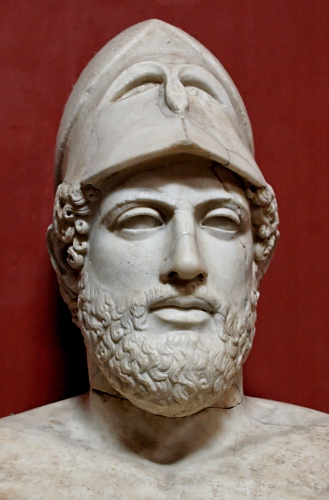 Alors que la Révolution française insuffle à l’Europe une énergie philosophique nouvelle, affirmant ressusciter l’esprit de la démocratie grecque, un soupçon germe déjà dans l’esprit de Hegel : cette filiation avec l’Antiquité ne repose-t-elle pas sur un malentendu ? Par la figure de Périclès, le philosophe révèle l’erreur d’interprétation commise par ceux qui se réclament de la démocratie athénienne. Présentée comme une révolution chargée de promesses égalitaires que Périclès se serait empressé de trahir, ne fut-elle pas plutôt la célébration de la liberté et de la vertu individuelles, dont Périclès s’avéra le plus admirable serviteur ?
Alors que la Révolution française insuffle à l’Europe une énergie philosophique nouvelle, affirmant ressusciter l’esprit de la démocratie grecque, un soupçon germe déjà dans l’esprit de Hegel : cette filiation avec l’Antiquité ne repose-t-elle pas sur un malentendu ? Par la figure de Périclès, le philosophe révèle l’erreur d’interprétation commise par ceux qui se réclament de la démocratie athénienne. Présentée comme une révolution chargée de promesses égalitaires que Périclès se serait empressé de trahir, ne fut-elle pas plutôt la célébration de la liberté et de la vertu individuelles, dont Périclès s’avéra le plus admirable serviteur ?
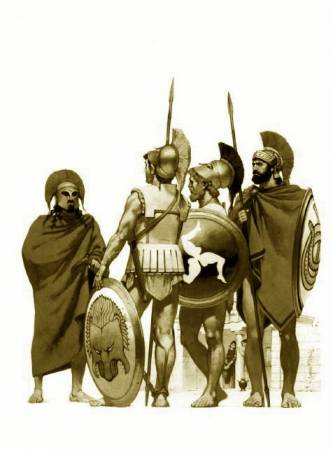 Tandis que les autres chasseurs festoyaient autour de leurs feux, Dienekès fit place à ses côtés à Alexandros et Ariston et les pria de s’asseoir. Je devinai son intention. Il allait leur parler de la peur. Car il savait qu’en dépit de leur réserve, ces jeunes gens sans expérience de la bataille se rongeaient à la perspective des épreuves prochaines.
Tandis que les autres chasseurs festoyaient autour de leurs feux, Dienekès fit place à ses côtés à Alexandros et Ariston et les pria de s’asseoir. Je devinai son intention. Il allait leur parler de la peur. Car il savait qu’en dépit de leur réserve, ces jeunes gens sans expérience de la bataille se rongeaient à la perspective des épreuves prochaines.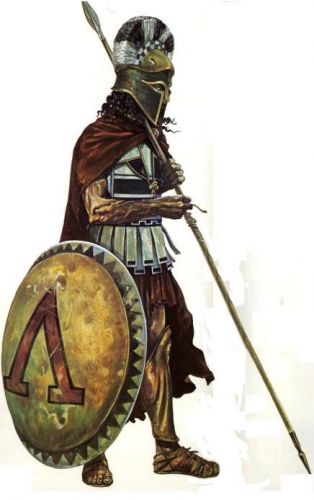 Ces femmes que nous admirons donnent les vies de leurs fils à leur pays, afin que leur nation puisse survivre, même si leurs fils périssent. Nous avons entendu depuis notre enfance l’histoire de cette mère qui, apprenant que ses cinq fils étaient morts à la guerre, a demandé : « Est-ce que nous avons gagné ? » Et, quand elle a appris que nous avions gagné, en effet, elle est retournée chez elle sans une larme et elle a dit : « Dans ce cas, je suis contente. » Est-ce que ce n’est pas cette noblesse-là qui nous émeut dans le sacrifice des femmes ?
Ces femmes que nous admirons donnent les vies de leurs fils à leur pays, afin que leur nation puisse survivre, même si leurs fils périssent. Nous avons entendu depuis notre enfance l’histoire de cette mère qui, apprenant que ses cinq fils étaient morts à la guerre, a demandé : « Est-ce que nous avons gagné ? » Et, quand elle a appris que nous avions gagné, en effet, elle est retournée chez elle sans une larme et elle a dit : « Dans ce cas, je suis contente. » Est-ce que ce n’est pas cette noblesse-là qui nous émeut dans le sacrifice des femmes ?
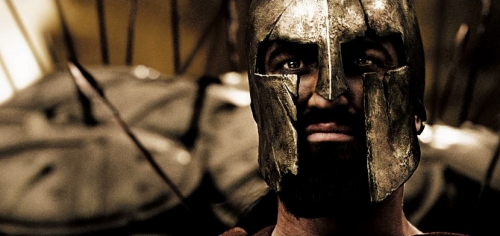
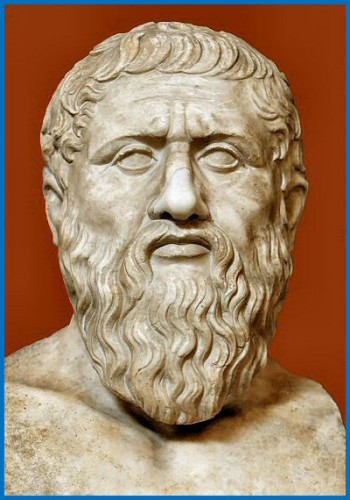
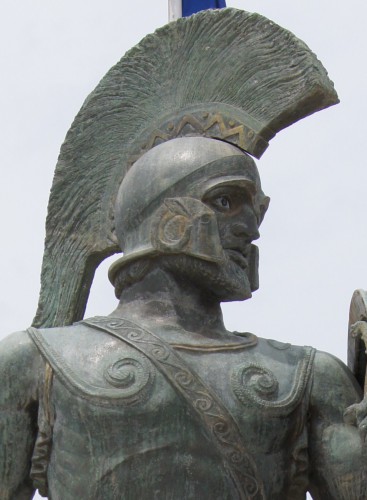
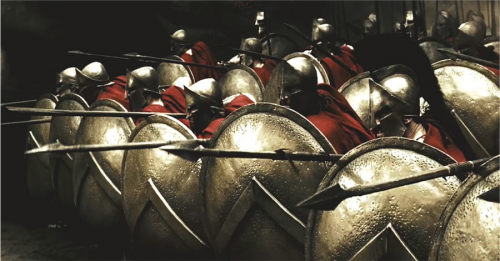
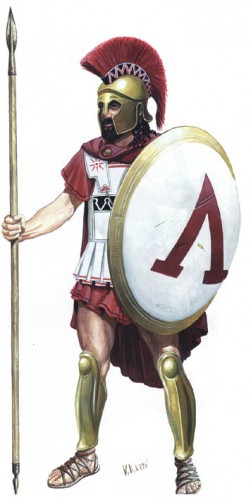 Agis was thus led to the execution chamber, and, according to Plutarch;
Agis was thus led to the execution chamber, and, according to Plutarch; La suite attendue du film « 300 » de Zach Snyder, intitulée « l’Avènement d’un Empire » (Rise of an Empire), est récemment sortie sur nos écrans. A la musique, Tyler Bates a cédé la place à Junkie XL, qui nous propose une bande originale brillante, finissant en apothéose en mêlant son dernier morceau à une mélodie de Black Sabbath.
La suite attendue du film « 300 » de Zach Snyder, intitulée « l’Avènement d’un Empire » (Rise of an Empire), est récemment sortie sur nos écrans. A la musique, Tyler Bates a cédé la place à Junkie XL, qui nous propose une bande originale brillante, finissant en apothéose en mêlant son dernier morceau à une mélodie de Black Sabbath.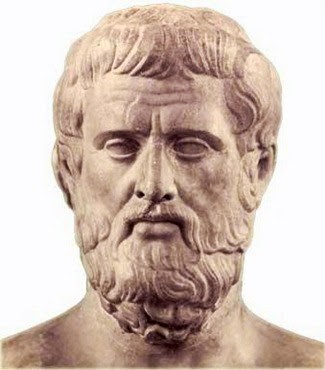
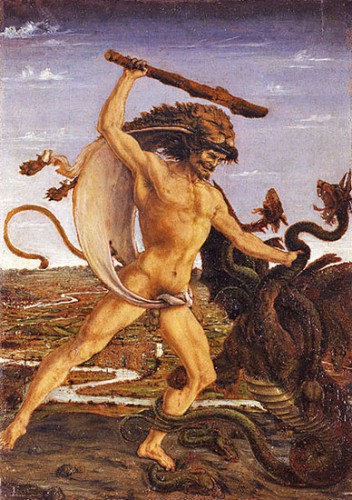
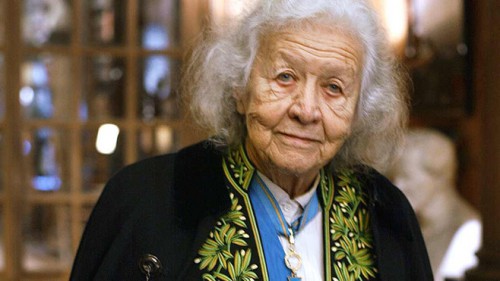
 Jacqueline de Romilly se base ici sur Sophocle et surtout Thucydide où elle décèle les éléments d’une sagesse politique tendant à des vérités valables pour le présent mais aussi l’avenir.
Jacqueline de Romilly se base ici sur Sophocle et surtout Thucydide où elle décèle les éléments d’une sagesse politique tendant à des vérités valables pour le présent mais aussi l’avenir.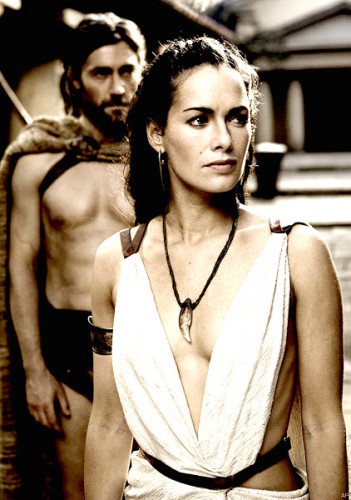



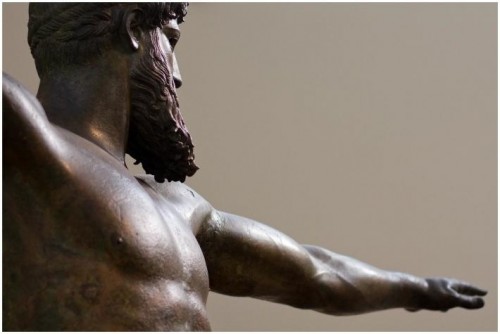
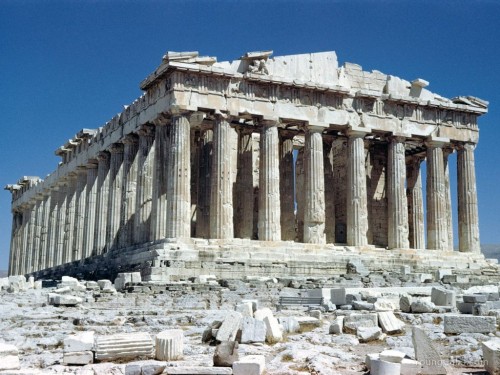
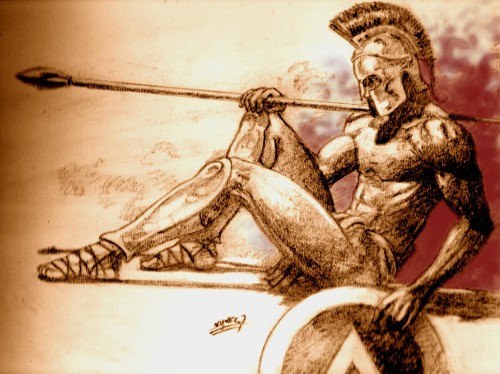
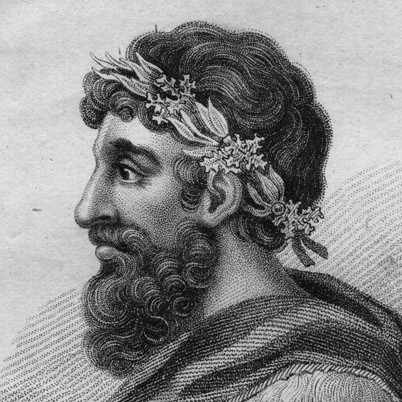 Just as Mussolini looked to Ancient Rome for the model of a healthy, organic society, the Ancient Romans looked to Sparta. In the first century (A.D.), as Rome continued its imperial ascent to near-hemispheric domination, the distance between the virtuous Republican nobility and the garish imperial nobility began to alert many to the potential for social degeneration. One of these was Plutarch, a Roman scholar of Greek birth.
Just as Mussolini looked to Ancient Rome for the model of a healthy, organic society, the Ancient Romans looked to Sparta. In the first century (A.D.), as Rome continued its imperial ascent to near-hemispheric domination, the distance between the virtuous Republican nobility and the garish imperial nobility began to alert many to the potential for social degeneration. One of these was Plutarch, a Roman scholar of Greek birth.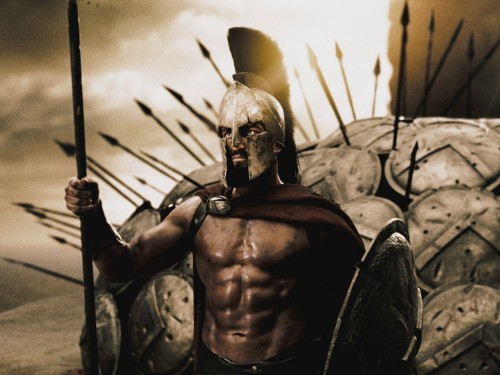





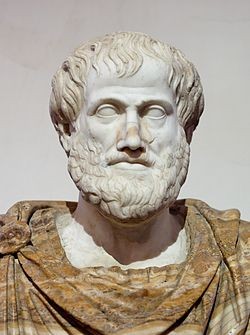

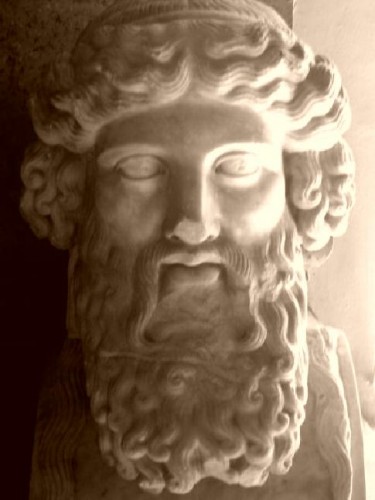 mpossible, et pour beaucoup improbable ? Pourtant, les monuments écrits laissent entrevoir des situations que l’on pourrait nommer, au risque de l’anachronisme, « totalitaires », où non seulement l’on était sommé de prendre position, mais aussi de participer, de manifester son adhésion passivement ou activement.
mpossible, et pour beaucoup improbable ? Pourtant, les monuments écrits laissent entrevoir des situations que l’on pourrait nommer, au risque de l’anachronisme, « totalitaires », où non seulement l’on était sommé de prendre position, mais aussi de participer, de manifester son adhésion passivement ou activement.





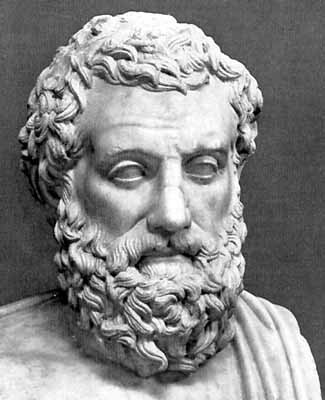 Greek tragedy is all but forgotten in mainstream culture, but there is a very good reason for looking at it again with fresh eyes. The reasons for this are manifold, but they basically have to do with anti-materialism and the culture of compression. To put it bluntly, reading Greek tragedy can give literally anyone a crash course in Western civilization which is short, pithy, and terribly apt.
Greek tragedy is all but forgotten in mainstream culture, but there is a very good reason for looking at it again with fresh eyes. The reasons for this are manifold, but they basically have to do with anti-materialism and the culture of compression. To put it bluntly, reading Greek tragedy can give literally anyone a crash course in Western civilization which is short, pithy, and terribly apt.

